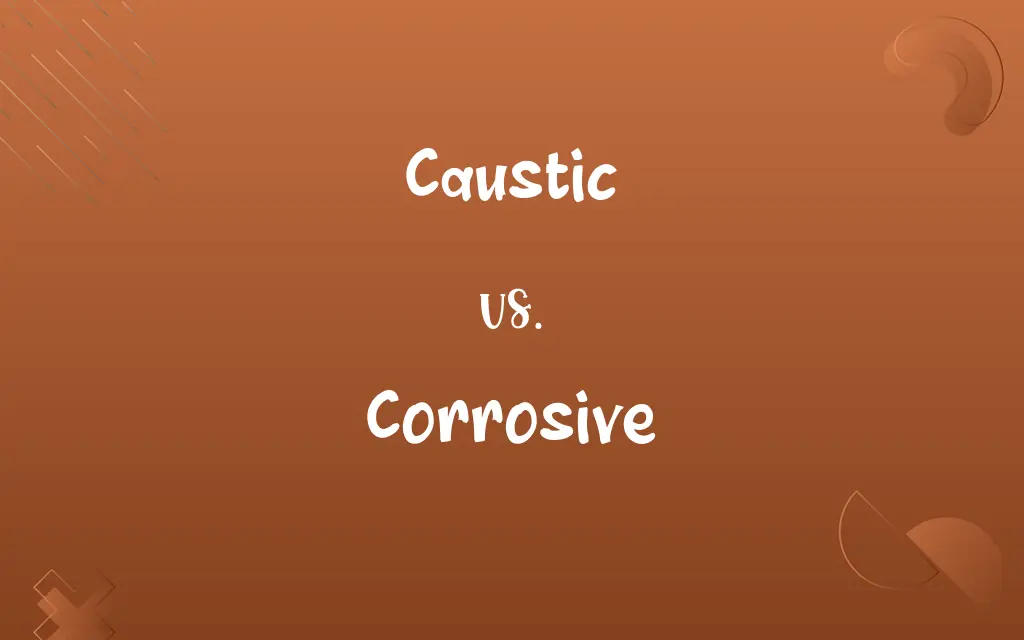Caustic vs. Corrosive: Know the Difference

By Shumaila Saeed || Updated on February 23, 2024
Caustic substances are chemicals that can burn or corrode organic tissue by chemical action. Corrosive substances include both acids and bases, capable of damaging or destroying other substances upon contact, including metals and living tissues.

Key Differences
Caustic substances specifically refer to a category of chemicals that have the ability to burn or erode organic materials, such as skin and tissues, through a chemical reaction. These substances are typically strong bases, like sodium hydroxide (lye) or potassium hydroxide, which react with water and organic material, leading to chemical burns. On the other hand, Corrosive substances encompass a broader range of materials that include not only strong bases but also strong acids, like sulfuric acid or hydrochloric acid, and some oxidizing agents.
Shumaila Saeed
Feb 23, 2024
Caustic is often used in a narrower context, highlighting the substance's capacity to cause tissue damage, especially in medical or safety discussions. Corrosives are defined by their ability to break down various types of substances, including metals, plastics, and living tissues, through chemical reactions. These reactions can lead to the material's deterioration or complete destruction, depending on the substance's concentration and exposure duration.
Shumaila Saeed
Feb 23, 2024
The primary distinction between caustic and corrosive lies in their scope and application. While all caustic substances are corrosive, not all corrosive substances are caustic. The term "corrosive" is more inclusive, capturing a wider array of chemical behaviors and effects, including the action of acids, bases, and oxidizers. Understanding these differences is crucial for handling these substances safely, particularly in industrial, laboratory, and healthcare settings, where proper identification and precautions can prevent damage and injuries.
Shumaila Saeed
Feb 23, 2024
Comparison Chart
Definition
Chemicals that burn or erode organic tissue through chemical action, typically alkaline.
Substances that can damage or destroy other substances, including acids, bases, and oxidizing agents.
Shumaila Saeed
Feb 23, 2024
Nature
Always alkaline (bases).
Includes both acids and bases, as well as oxidizing agents.
Shumaila Saeed
Feb 23, 2024
ADVERTISEMENT
Common Examples
Sodium hydroxide, potassium hydroxide.
Sulfuric acid, hydrochloric acid, sodium hydroxide.
Shumaila Saeed
Feb 23, 2024
Primary Use
Cleaning agents, drain cleaners, soap making.
Cleaning, etching, rust removal, various industrial processes.
Shumaila Saeed
Feb 23, 2024
Effect on Metals
Generally, less reaction with metals compared to acids.
Can significantly damage or even dissolve metals.
Shumaila Saeed
Feb 23, 2024
Safety Concerns
Can cause chemical burns on organic tissue.
Can cause burns, damage to materials, and environmental harm.
Shumaila Saeed
Feb 23, 2024
Caustic and Corrosive Definitions
ADVERTISEMENT
Corrosive
Environmental and safety hazards.
Proper disposal of corrosive chemicals is essential to prevent environmental damage.
Shumaila Saeed
Feb 23, 2024
Caustic
Any substance or means which, applied to animal or other organic tissue, burns, corrodes, or destroys it by chemical action; an escharotic.
Shumaila Saeed
Oct 19, 2023
Corrosive
Eating away; having the power of gradually wearing, hanging, or destroying the texture or substance of a body; as the corrosive action of an acid.
Shumaila Saeed
Oct 19, 2023
Caustic
Sarcastic or cutting; biting
“The caustic jokes ... deal with such diverse matters as political assassination, talk-show hosts, medical ethics” (Frank Rich).
Shumaila Saeed
Oct 19, 2023
Corrosive
That which has the power of fretting or irritating.
Such speeches . . . are grievous corrosives.
Shumaila Saeed
Oct 19, 2023
ADVERTISEMENT
Caustic
Of a substance, especially a strong acid; capable of destroying or eating away by chemical action
Shumaila Saeed
Oct 19, 2023
Corrosive
That which has the quality of eating or wearing away gradually.
[Corrosives] act either directly, by chemically destroying the part, or indirectly by causing inflammation and gangrene.
Shumaila Saeed
Oct 19, 2023
Corrosive
Substances that destroy materials.
Corrosive acids are used in metal etching.
Shumaila Saeed
Feb 23, 2024
Corrosive
Includes acids and bases.
Both corrosive acids and alkaline solutions require careful storage.
Shumaila Saeed
Feb 23, 2024
Caustic
Any substance or means which, applied to animal or other organic tissue, burns, corrodes, or destroys it by chemical action; an escharotic.
Shumaila Saeed
Oct 19, 2023
Corrosive
Can damage metals and tissues.
Corrosive substances can cause severe burns or corrode metals upon contact.
Shumaila Saeed
Feb 23, 2024
Corrosive
Having the capability or tendency to cause corrosion
A corrosive acid.
Shumaila Saeed
Oct 19, 2023
Caustic
(of language, etc.) Sharp, bitter, cutting, biting, and sarcastic in a scathing way.
Shumaila Saeed
Oct 19, 2023
Corrosive
Gradually destructive; steadily harmful
Corrosive anxiety.
Corrosive increases in prices.
A corrosive narcotics trade.
Shumaila Saeed
Oct 19, 2023
Caustic
Can erode organic materials.
Caustic substances are effective in removing organic buildups.
Shumaila Saeed
Feb 23, 2024
Caustic
Requires safety precautions.
Always use eye protection when working with caustic materials.
Shumaila Saeed
Feb 23, 2024
Corrosive
Having the quality of fretting or vexing.
Care is no cure, but corrosive.
Shumaila Saeed
Oct 19, 2023
Corrosive
Used across industries.
Corrosives play a crucial role in manufacturing and maintenance.
Shumaila Saeed
Feb 23, 2024
Corrosive
A substance having the capability or tendency to cause corrosion.
Shumaila Saeed
Oct 19, 2023
Caustic
Alkaline substances causing tissue burns.
Caustic soda is used in soap making but requires careful handling.
Shumaila Saeed
Feb 23, 2024
Caustic
Capable of burning, corroding, dissolving, or eating away by chemical action.
Shumaila Saeed
Oct 19, 2023
Corrosive
Eating away; having the power of gradually wearing, changing, or destroying the texture or substance of a body; as, the corrosive action of an acid.
Shumaila Saeed
Oct 19, 2023
Caustic
The enveloping pattern formed by light rays reflecting or refracting from a curved surface.
Shumaila Saeed
Oct 19, 2023
Corrosive
A substance having the tendency to cause corrosion (such a strong acids or alkali)
Shumaila Saeed
Oct 19, 2023
Caustic
Capable of destroying the texture of anything or eating away its substance by chemical action; burning; corrosive; searing.
Shumaila Saeed
Oct 19, 2023
Corrosive
Any solid, liquid or gas capable of irreparably harming living tissues or damaging material on contact.
Shumaila Saeed
Oct 19, 2023
Caustic
Strong bases that are reactive.
Wearing gloves is necessary when handling caustic chemicals.
Shumaila Saeed
Feb 23, 2024
Caustic
Used in cleaning agents.
Caustic cleaners can unclog drains but pose risks to skin.
Shumaila Saeed
Feb 23, 2024
Repeatedly Asked Queries
What precautions should be taken when handling caustic or corrosive substances?
Use personal protective equipment (PPE), such as gloves, goggles, and aprons, and ensure proper ventilation.
Shumaila Saeed
Feb 23, 2024
How can you neutralize a caustic spill?
Caustic spills can be neutralized with a weak acid, but it's crucial to do so carefully to avoid heat and gas generation.
Shumaila Saeed
Feb 23, 2024
What is the environmental impact of caustic and corrosive substances?
These substances can cause environmental damage if not disposed of properly, including water and soil contamination.
Shumaila Saeed
Feb 23, 2024
Why are some corrosive substances used in cleaning products?
Their ability to break down organic and inorganic materials makes them effective in removing stains, grease, and blockages.
Shumaila Saeed
Feb 23, 2024
Are all caustic substances also corrosive?
Yes, all caustic substances are considered corrosive due to their ability to cause tissue damage and chemical burns.
Shumaila Saeed
Feb 23, 2024
Can corrosive substances be safely mixed with other chemicals?
Mixing corrosive substances with other chemicals can be dangerous and should only be done with thorough knowledge of the reactions involved.
Shumaila Saeed
Feb 23, 2024
How are caustic and corrosive substances regulated?
They are regulated by health and safety guidelines to ensure proper labeling, storage, handling, and disposal to minimize risks to humans and the environment.
Shumaila Saeed
Feb 23, 2024
How do you treat a skin burn from a caustic or corrosive substance?
Rinse the area with plenty of water for at least 15-20 minutes and seek medical attention immediately.
Shumaila Saeed
Feb 23, 2024
Can corrosive substances be stored together?
Corrosive substances should be stored according to compatibility guidelines to prevent dangerous reactions.
Shumaila Saeed
Feb 23, 2024
What industries heavily use caustic and corrosive substances?
Industries such as manufacturing, cleaning, pharmaceuticals, and food processing use these substances for various purposes.
Shumaila Saeed
Feb 23, 2024
Share this page
Link for your blog / website
HTML
Link to share via messenger
About Author
Written by
Shumaila SaeedShumaila Saeed, an expert content creator with 6 years of experience, specializes in distilling complex topics into easily digestible comparisons, shining a light on the nuances that both inform and educate readers with clarity and accuracy.









































































